Institute for Research on Innovation and Services for Development
Resilience - Innovation - Sustainable Development | Transparency – Organization – Meritocracy
Turismo in Italia, il sorpasso degli stranieri
February 11th, 2019
Centinaio: una cabina di regia per spingere l’Italia del turismo
February 11th, 2019
Al via la BIT, presenze turistiche in Italia a 430 mln nel 2018
February 11th, 2019
Al Tg2 la ricerca dell’Iriss-Cnr sul turismo in Italia
February 10th, 2019
CLIC LabT “Symposium on Innovative Finance for Cultural Heritage 2019”
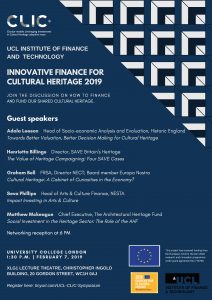 In the framework of the CLIC EU Horizon 2020 project, coordinated by CNR-IRISS, UCL Institute of Finance and Technology will host a symposium on innovative financial models and instruments to preserve and increase the value of both material and immaterial heritage assets, leveraging on their potential for increasing social cohesion and personal wellbeing, as well as on their pivotal role in building cultural identity and a sense of belonging across diverse communities.
In the framework of the CLIC EU Horizon 2020 project, coordinated by CNR-IRISS, UCL Institute of Finance and Technology will host a symposium on innovative financial models and instruments to preserve and increase the value of both material and immaterial heritage assets, leveraging on their potential for increasing social cohesion and personal wellbeing, as well as on their pivotal role in building cultural identity and a sense of belonging across diverse communities.
Professor Francesca Medda (Director, Institute of Finance and Technology, UCL) will open the works introducing the CLIC project, dedicated to develop, test and validate innovative circular business, financing and governance models to place cultural heritage and historical urban landscapes adaptive reuse at the forefront for the implementation of a European model of circular economy and circular city-region centered on the regeneration of cultural and natural capital.
Leading industry practitioners will then provide the audience with insight and concrete examples of financial innovation in the cultural and creative sector.
Speakers include Adala Leeson, Head of Social and Economic Research and Insight at Historic England; Graham Bell, Director, North of England Civic Trust; Henrietta Billings, Director, SAVE Britain’s Heritage; Matthew Mckeague, Chief Executive, The Architectural Heritage Fund and Seva Phillips, Head of Arts & Culture Finance, NESTA.
The Symposium will be held on February 7th at UCL’s Christopher Ingold Building from 1:30pm and will be followed by a reception.
You can sign up for the event using this link: http://tinyurl.com/ucl-clic-symposium
Resources
January 28th, 2019
ELA Doctorate Workshop 2019 – Edinburgh, June 26th/29th 2019
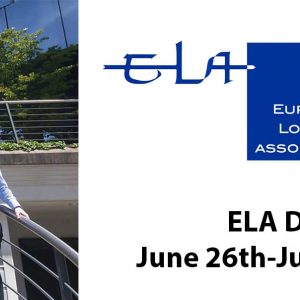
 The twenty-fourth ELA Doctorate Workshop will take place in Edinburgh (UK) from June 26thuntil June 29th 2019 at Heriot-Watt University.
The twenty-fourth ELA Doctorate Workshop will take place in Edinburgh (UK) from June 26thuntil June 29th 2019 at Heriot-Watt University.
Deadline for application: March 4th, 2019.
Aim of the workshop:
- Help the students in progressing their research programme,
- Establish a valuable pan-European network of doctoral students in the field of logistics and SCM,
- Allow the participating students to improve their skills in managing and solving their research problems.
Format of the workshop:
- During the workshop, each of the selected students will present their project in a “big group”,
- After the presentation (15 minutes max.) there will be a discussion/questions session led by the moderator (10 minutes max.) and followed by questions from two students acting as discussants (5 minutes max.),
- The ambition is to help each other in developing the research projects.
Moderators:
- – Prof. Dr. Pietro Evangelista (Chairman), CNR IRISS (Italy),
- – Prof. Dr. Jukka Hallikas, Lappeenranta University of Technology (Finland),
- – Prof. Dr. Simon Emde, Technische Universität Darmstadt (Germany),
- – Prof. Dr. Violeta Roso, Chalmers University of Technology (Sweden).
On Thursday 27thJune 2019, (from 11:00 until 12:30) there will be a session entitled “Moderators panel presentations on contemporary topics” in which each moderator is expected to make a 15-20 minutes presentation about his/her research followed by some discussions.
On Friday 28thJune 2019 (from 11:10 until 12:30) there will be an academic keynote speech by Prof. Phil Greening (Heriot-Watt University, UK).
On Friday 29th June 2018 night there will be the final dinner. During that dinner,Prof. Hans Christian Pfohl (Member of the ELA- Board and Chairman of the ELA-Research committee) will award certificate to all the participating students.
Resources:
- Please note that updated information will be also available on the Facebook profile of the workshop: https://www.facebook.com/ELAdoctorateworkshop/?ref=bookmarks
- For further information about the workshop, please contact the Chairman of the workshop: Pietro Evangelista – PhD – Senior Researcher in Logistics and SCM – IRISS CNR -Ph.: +39 081 2470982 – Fax: +39 081 7618265 – E-mail: p.evangelista@iriss.cnr.it
- ELA PhD workshop_
January 16th, 2019
Qualità o quantità per il turismo nei luoghi di cultura? – Radio RAI, 21 Dicembre 2018
Venerdì 21 dicembre alle ore 23.50 su Radio RAI-RAI Parlamento andrà in onda la trasmissione “Qualità o quantità per il turismo nei luoghi di cultura?”
Intervengono Roberto Micera ricercatore del CNR IRISS e co-curatore del Rapporto sul Turismo Italiano, Maurizio Quagliuolo, Segretario Generale di Herity International e l’economista Pasquale Persico.
Resources
December 20th, 2018
Rassegna Internazionale del Cortometraggio MED-LIMES “Ai confini del Mediterraneo” – Salerno, 24/26 Maggio 2019

 La Rassegna Internazionale del Cortometraggio MED-LIMES “Ai Confini del Mediterraneo” è un concorso cinematografico internazionale che pone, tra i propri scopi, la diffusione della conoscenza e la promozione nei Paesi del Mediterraneo dei 17 Obiettivi di Sviluppo Sostenibile delle Nazioni Unite adottati nel 2015.
La Rassegna Internazionale del Cortometraggio MED-LIMES “Ai Confini del Mediterraneo” è un concorso cinematografico internazionale che pone, tra i propri scopi, la diffusione della conoscenza e la promozione nei Paesi del Mediterraneo dei 17 Obiettivi di Sviluppo Sostenibile delle Nazioni Unite adottati nel 2015.
Giovanni Carlo Bruno, ricercatore del CNR IRISS, fa parte del gruppo di esperti incaricati della selezione dei 25 cortometraggi da ammettere alla fase finale della rassegna, che si terrà a Salerno dal 24 al 26 maggio 2019.
Resources
December 20th, 2018
Port City Futures Conference – Rotterdam, 17/19 December 2018

 CNR IRISS has been invited to contribute to the “Port City Futures Conference”, be held at Rotterdam and Delft, The Netherlands, from 17th to 19th December.
CNR IRISS has been invited to contribute to the “Port City Futures Conference”, be held at Rotterdam and Delft, The Netherlands, from 17th to 19th December.
The conference, organized by prof. Carola Hein (Delft University of Technology) and Maurice Janssen (Erasmus Centre for Urban, Port and Transport Economics, Erasmus University Rotterdam), is dedicated to the manifold relations between cities and ports.
Historically, ports and cities have engaged with major transformations in interconnected ways – ways that will continue to play a role in the future.
A strong port city culture can help to resolve spatial development questions generated by contemporary urgencies, such as the energy transition, climate change, new technologies, transformations of work conditions so that the port and city (and region) can jointly evolve in a limited space.
To test this hypothesis and to develop a long-term research agenda, the conference brings together port, city and regional stakeholders and academics from various port-cities to compare their experience with Rotterdam one.
It aims to stimulate/facilitate discussions between participants on port city relationships by looking at the past and learning from it, identifying contemporary problems and creating future opportunities, identifying and connecting and involving main stakeholders identifying specific different political, economic, social, cultural settings.
Massimo Clemente and Eleonora Giovene di Girasole, researchers in the CNR IRISS, present their researches and participate in the discussion for contemporary challenges, future scenarios and main research questions on port city futures.
Resources
December 13th, 2018
Seminario di Studio “I Diritti Umani a settant’anni dalla Dichiarazione Universale delle Nazioni Unite”
Il 10 dicembre 2018 si è tenuto a Napoli, presso l’Università degli Studi di Napoli “L’Orientale”, un Seminario di studi dedicato al 70° anniversario dell’adozione della Dichiarazione Universale delle Nazioni Unite sui diritti dell’uomo.
Al Seminario hanno partecipato studiosi dei diritti umani provenienti dalle principali università e centri di ricerca della Campania, l’Università L’Orientale, l’Università Federico II, l’Università Luigi Vanvitelli, l’Università telematica Pegaso, l’Università di Salerno e l’IRISS – Istituto di Ricerca su Innovazione e Servizi per lo Sviluppo del CNR. Obiettivo dell’incontro è stato riflettere sul percorso evolutivo cui il corpus normativo per la tutela internazionale dei diritti umani è andato incontro nei settanta anni trascorsi dalla Dichiarazione, sui concetti di universalità e interdipendenza dei diritti umani, sulle sfide poste dalla realtà contemporanea e sullo stato di attuazione dei diritti umani sanciti nella Dichiarazione Universale delle Nazioni Unite.
Marco Fasciglione e Valentina Rossi, ricercatori del CNR IRISS, hanno partecipato al Seminario che ha avuto luogo presso l’Aula Conferenze di Palazzo Du Mesnil. Marco Fasciglione ha presentato una relazione su Diritti umani e imprese: dalla Dichiarazione universale ai Principi guida ONU su impresa e diritti umani; Valentina Rossi ha presentato una relazione in tema di Diritti umani e ambiente: il diritto all’informazione ambientale.
Per ulteriori informazioni
- Marco Fasciglione, Responsabile scientifico del progetto di ricerca CO.RE. – Corporate human rights and environmental due diligence e la promozione della COrporate REsponsibility, m.fasciglione.iriss.cnr.it, 081 2470991
- Valentina Rossi, Responsabile scientifico del progetto di ricerca AMARCOST – Modelli innovativi di governance ambientale per lo sviluppo sostenibile delle aree marino-costiere, v.rossi@iriss.cnr.it, 081 2470990.
- Locandina dell’evento “I Diritti Umani a settant’anni dalla Dichiarazione Universale delle Nazioni Unite”
December 11th, 2018
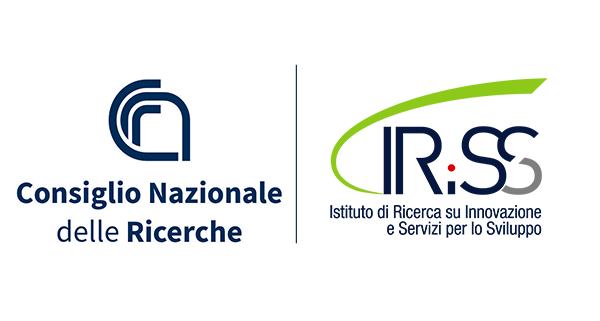
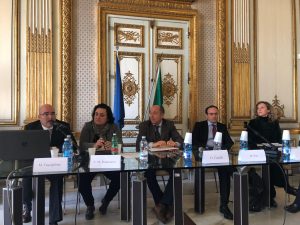
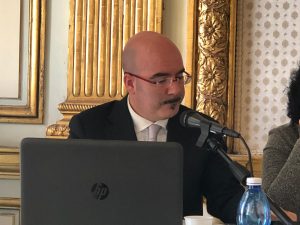
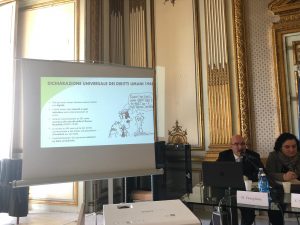
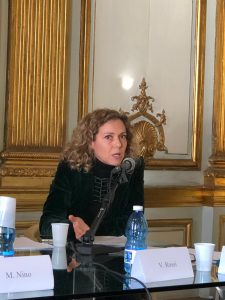
You must be logged in to post a comment.